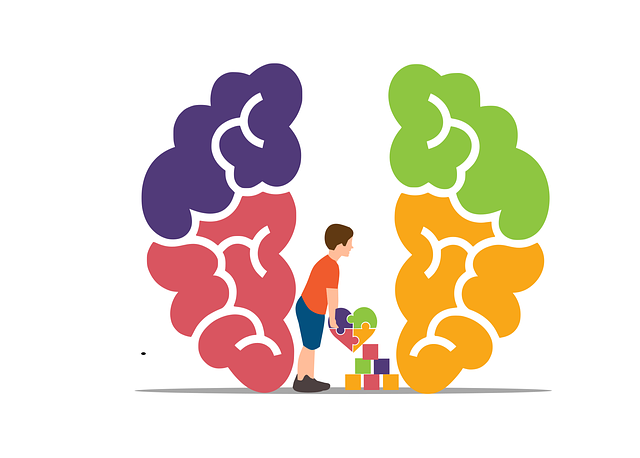Incorporating cultural sensitivity in mental wellness coaching is crucial for diverse populations, such as Parker Mandarin Chinese speakers. Parker Mandarin Chinese Speaking Therapy (PMCST) provides therapists with a framework to understand the relationship between language, culture, and mental health, enabling tailored interventions. By recognizing cultural context's impact on emotional expression, PMCST guides coaches in developing respectful strategies that enhance emotional regulation techniques. This approach prevents miscommunication and inappropriate interventions, fostering successful mental wellness outcomes for diverse clients. Key components include integrating evidence-based practices like CBT and mindfulness meditation, cultural competency training for healthcare providers, public awareness campaigns to destigmatize seeking help, and strategic, inclusive program implementation with data-driven evaluations.
Mental wellness coaching programs are evolving to meet the diverse needs of individuals from various cultural backgrounds. This article explores the development of such programs, focusing on the unique perspective of Parker Mandarin Chinese Speaking Therapy. We delve into strategies for incorporating evidence-based practices that resonate with cultural relevance, ensuring inclusive initiatives. By understanding cultural sensitivity and implementing successful evaluation methods, coaching programs can effectively support mental wellness across diverse communities, including the growing Mandarin-speaking population.
- Understanding Cultural Sensitivity in Mental Wellness Coaching: A Parker Mandarin Chinese Speaking Therapy Perspective
- Designing Effective Programs: Incorporating Evidence-Based Practices for Cultural Relevance
- Implementation and Evaluation: Strategies for Success in Developing and Delivering Inclusive Coaching Initiatives
Understanding Cultural Sensitivity in Mental Wellness Coaching: A Parker Mandarin Chinese Speaking Therapy Perspective

In the context of mental wellness coaching, especially when considering a diverse population like Parker Mandarin Chinese speakers, understanding and incorporating cultural sensitivity is paramount. Cultural sensitivity in mental healthcare practice ensures that interventions are tailored to meet the unique needs and perspectives of individuals from different backgrounds. For example, Parker Mandarin Chinese Speaking Therapy (PMCST) offers a lens through which therapists can explore the intricate interplay between language, culture, and mental health. By recognizing the profound impact of cultural context on emotional expression and regulation, PMPCT guides coaches in developing strategies that are both effective and respectful.
This approach is crucial for preventing issues like miscommunication or inappropriate interventions that might arise from a lack of cultural understanding. For instance, certain cultural norms influence the way individuals express distress or seek help, which can be misinterpreted if not considered. By integrating cultural sensitivity into coaching programs, practitioners can enhance emotional regulation techniques, ensuring they resonate with clients’ personal and cultural experiences, ultimately fostering more meaningful and successful mental wellness outcomes.
Designing Effective Programs: Incorporating Evidence-Based Practices for Cultural Relevance

In designing effective mental wellness coaching programs, incorporating evidence-based practices is paramount for ensuring cultural relevance and accessibility. This approach aligns with the principles of Parker Mandarin Chinese Speaking Therapy, emphasizing the importance of language and cultural context in delivering quality care. By integrating methods backed by robust research, such as cognitive-behavioral therapy (CBT) and mindfulness meditation, programs can cater to diverse populations while maintaining effectiveness.
Cultural competency training for healthcare providers is a key component, enabling professionals to understand and address the unique needs of individuals from various cultural backgrounds. Public awareness campaigns development that promote mental wellness and destigmatize seeking help also play a significant role. These initiatives ensure that everyone, regardless of their cultural or linguistic background, has access to tailored support, fostering an inclusive environment for improved mental health outcomes.
Implementation and Evaluation: Strategies for Success in Developing and Delivering Inclusive Coaching Initiatives

Implementing and evaluating mental wellness coaching programs requires a strategic approach to ensure their success and inclusivity. Firstly, tailor coaching initiatives to diverse populations by incorporating culturally sensitive practices, such as integrating Parker Mandarin Chinese-speaking therapy for communities with specific linguistic needs. This ensures that coaching sessions are accessible and effective for all participants.
Additionally, incorporate Self-Awareness Exercises and Mind Over Matter Principles to promote personal growth and resilience. Regularly assess program effectiveness through feedback mechanisms, measuring key performance indicators (KPIs), and observing improvements in burnout prevention strategies among healthcare providers and other target groups. By combining these evaluation methods, coaches can make data-driven adjustments, enhancing the overall impact and sustainability of coaching programs.
The development of mental wellness coaching programs, with a focus on cultural sensitivity, particularly from the perspective of Parker Mandarin Chinese Speaking Therapy, is essential in today’s diverse society. By incorporating evidence-based practices tailored to meet the unique needs of different cultural groups, we can create inclusive initiatives that foster positive mental health outcomes. Implementation strategies outlined in this article provide a roadmap for success, ensuring that coaching programs are effective, accessible, and beneficial to all individuals, regardless of their cultural background.










